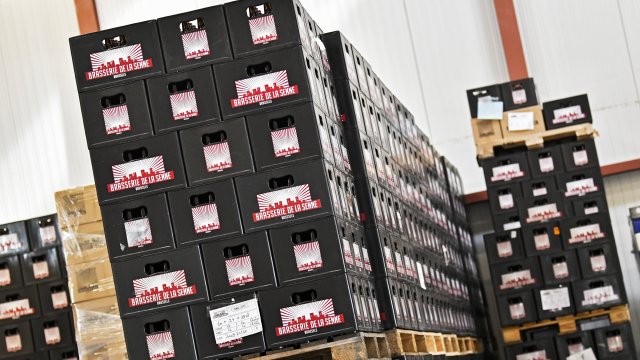One in three craft breweries threatened with bankruptcy
Intimately linked to the hospitality industry, craft breweries are bloodless. Their federation pleads for a rapid reopening of the terraces, then lasting for the rest.
The suffering endured by the cafes and restaurants sector forced to remain closed in the face of the virus submit, upstream, their suppliers to equally harsh constraints. Among these, the brewers are hit hard. To measure the extent of the impact on them, their federation Belgian Brewers asked the business data analysis office Graydon to scan their sector.
Graydon’s conclusions call to mind: if 87.5% of Belgian small and medium-sized breweries (less than 50 jobs) were healthy before the crisis, they are not more than 28.4% today. In other words, barely fifty of them have remained financially above the waterline, against 150 twelve months ago. They live a situation actually worse than that of bars and restaurants. According to the same analysis grid, 79% of these latter establishments were healthy before the pandemic, against 37% today.
Among the companies in difficulty in both sectors, 31.8% of craft breweries are currently on the verge of bankruptcy, for 17.9% of cafes and restaurants. In terms of number of establishments, of course, the relationship is different: we are talking here about 56 breweries for 2,251 hospitality companies.
“We want to open a constructive debate with the authorities to see how the hospitality industry can be part of the solution rather than the problem.”
The fate of the two sectors is closely linked. “And each additional day of closure represents a very high cost for the whole of Belgian society “, notes Krishan maudgal, the director of Brasseurs Belges. How many? Around one million euros per day for brewers and 7.5 million per day for the catering industry. Brewers therefore plead for a complete and sustainable reopening of the hospitality sector on May 1st and for the reopening of the terraces from the Easter holidays. “We want to open a constructive debate with the authorities to see how the hospitality industry can be part of the solution rather than the problem”, continues Maudgal.
“A regulated place”
Yvan De Baets, co-founder of the Brewery of the Senne, continues: “A cafe or a restaurant is a regulated place, where the keeper acts a bit like a sheriff: he is used to manage human groups, it has the skills to enforce preventive measures in its establishment. “And the terraces can offer a secure relaxing environment according to the strict protocols of the hospitality industry, adds the federation.
The Brasserie de la Senne is 90% linked to the hospitality industry
The Brasserie de la Senne, which recently built a brand new factory on the Tour & Taxis site in Brussels, distributes 90% of its beers via cafes and restaurants. “Our situation was quite healthy until March 2020, then this meteorite fell on us”, describes its co-founder Yvan De Baets.
If it did not receive any specific help, the company did good use of collective aid measures implemented, such as temporary unemployment and VAT deferral. “Essential aid, of course, but the problem remains unresolved, because for the debts, it is only a question of postponement: on resumption, payments will have to be resumed when in reality the crisis will undoubtedly continue. “Why?” Because the bars and restaurants are bloodless, they don’t have a penny any more: when they start ordering us again, they won’t be able to pay us. “Snowball effect in sight. That could be reversed by increasing aid to the hotel and catering industry: which will then be able to irrigate its suppliers, who in turn … etc.
Another problem: regional aid is conditional on a fall in turnover of at least 40% (Tetra bonuses in Brussels, in particular). “If you lose 39%, you are not entitled to it”, protests De Baets. “We should either provide more flexible levels of aid, or analyze each accounting situation individually.”
It is a question of saving the sector, but also of helping to preserve mental health Belgians, underlines Krishan Maudgal, who quotes a study by the University of Antwerp in support of his statements. This showed last month that the activity that our fellow citizens most want to resume is to have a drink or eat on the terrace (71% of respondents). Incidentally, he also notes that the neighboring countries are on the verge of authorizing the reopening of the hotel and catering industry, which is likely to arouse an “exodus” of consumers.
Brewers will also have need financial help, as Graydon’s study shows: the 50 companies directly threatened with bankruptcy will no longer get by without support. And if the hospitality industry reopens later, this support will be more expensive. Graydon estimates the needs at 30 million euros for breweries and 279 million for the formerly healthy cafes and restaurants to be saved, in the event of a complete reopening of the hospitality industry on May 1. Concretely, it would be necessary to reinforce the current premiums for the closure or the fall of income, then to extend the aid during the recovery by maintaining the VAT at 6% in the hospitality industry, the exemption of social security contributions, the recovery of excise duties on expired beers, etc.
